For an entire generation, Kobe Bryant served as a star who shined just a little more than others. Even when playing with the best, he left no doubt that he was the alpha dog of the entire league.
His untimely death is still being felt around the sports world, and his legacy continues to be celebrated in the NBA. The All-Star Game is part of that, where he has had some incredible performances playing with the brightest stars around him.
Here is his history in the NBA’s midseason exhibition of the stars.
Kobe Bryant’s All-Star legacy

Kobe Bryant’s career is defined by his unequaled competitive spirit. Even in an exhibition, he never passed up a chance to show the rest of the league he was the best of the best. The Black Mamba made it to 18 straight NBA All-Star Games; four of those times he led the league in votes. He led all scorers in four of those contests and also claimed four All-Star MVPs — tied with Bob Pettit for the most ever. Despite it being a meaningless exhibition game, Bryant gave the fans a show, whether with a steal and a dunk or a show-stopping play, never taking for granted the opportunity to entertain. He ended his All-Star career with the second-most points scored and has the most steals in the game’s history.
1997 – Rookie-year rejection

Not all stories have storybook beginnings. Kobe Bryant was riding the bench his rookie year, so he didn’t get many All-Star votes, But he did get enough notice from the league to participate in the Rookie Challenge, and he didn’t waste the opportunity. He led all players with 31 points, giving the league a taste of things to come.
1997 – Slam Dunk champion
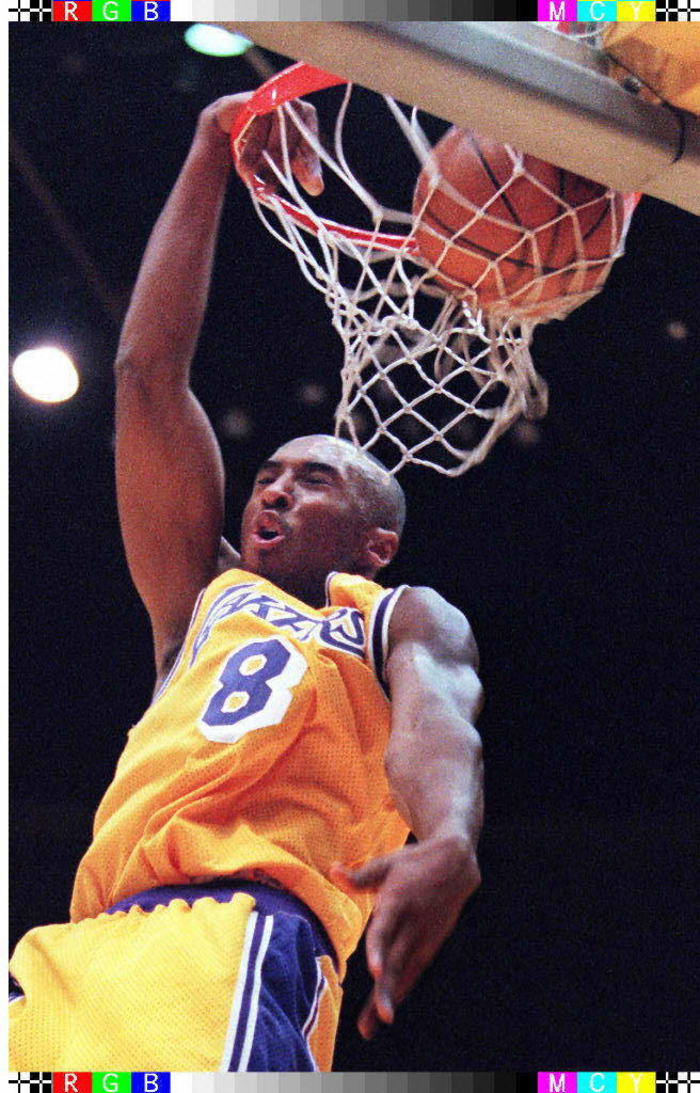
Kobe Bryant may not have made the NBA All-Star Game in 1997, but he definitely made an impression. After he played in the Rookie Challenge earlier in the day, he participated in the dunk contest at NBA All-Star Saturday night. He had an impressive first round with two dunks: a sweeping one-handed reverse and a double-pump, two-handed reverse. He then ended the contest with a between-the-legs, Eastbay funk dunk that J.R. Rider used in the 1994 dunk contest to win the 1997 event. Winning was never hard for Bryant, and the dunk contest was just the beginning for him.
1998 – First All-Star appearance 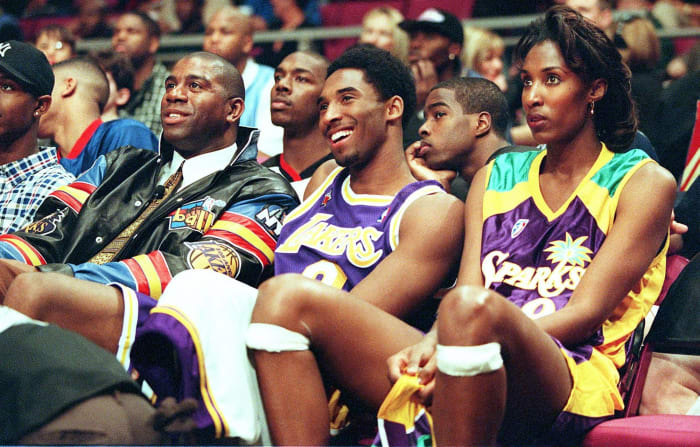
It didn’t take long for Kobe Bryant to establish himself as a bona fide NBA star. Despite coming off the bench, Bryant scored 15.4 points per game and was selected to be in his first NBA All-Star Game at the tender age of 19, the youngest All-Star ever. He didn’t waste time impressing the crowd. The East won, but Bryant led the Western Conference with 18 points. Not bad for a first-timer.
1999 – Locked out
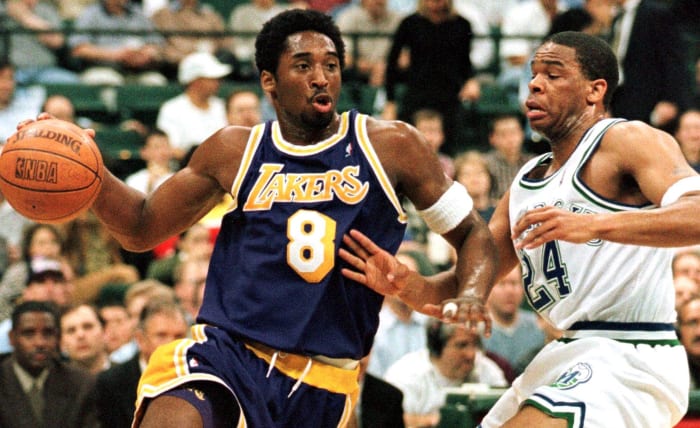
PAUL BUCK/AFP via Getty Images
To be fair to Bryant, no one made the All-Star team this year because there was no All-Star Game. The NBA lockout shortened the season, which started on Feb. 5, and the annual midseason exhibition was left on the cutting room floor. That didn’t stymie Frobe’s development, as he increased all of his stats, scoring nearly 20 points per game.
2000 – Million-vote man

A year after the NBA lockout, Bryant continued his assault on the league, becoming the unquestioned second star of the Los Angeles Lakers. His efforts resulted in his first All-Star Game for which he received 1 million votes. He took a back seat to teammate Shaquille O’Neal, who would win MVP, but he scored 15 points in 28 minutes of action.
2001 – A lost duel

After winning a championship, young Bryant’s confidence was at an all-time high and he wasn’t pulling any punches in Washington D.C. in the 2001 All-Star Game. Bryant and Stephon Marbury engaged in a duel in the fourth quarter, trading clutch basket after clutch basket. However, with the game on the line, he passed the ball off to Tim Duncan, who missed the potential game-winning shot. Bryant still finished the game with a Western Conference-high 19 points and added seven assists.
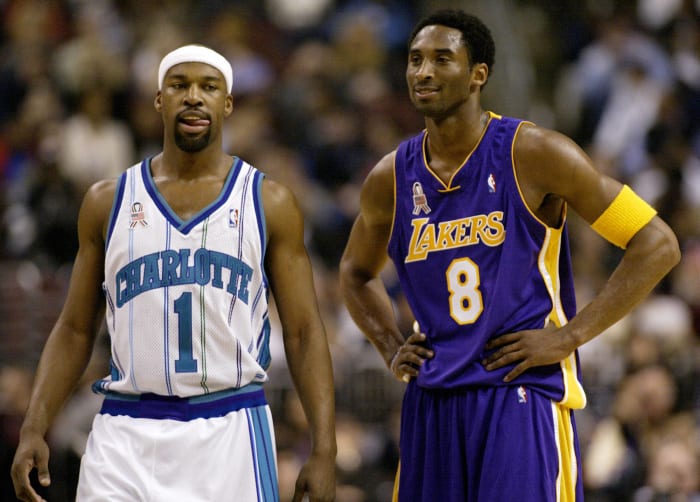
With Philadelphia hosting the All-Star Game, you knew Bryant, who went to high school outside of Philly, had something special planned. He didn’t disappoint. He lit up the Eastern Conference with his versatile scoring touch, finishing the game 31 points, five rebounds and five assists. He claimed his first All-Star Game MVP, but considered a traitor by fans, he was greeted with boos as he accepted the award. Welcome home, kid.
2003 – Winning the popular vote
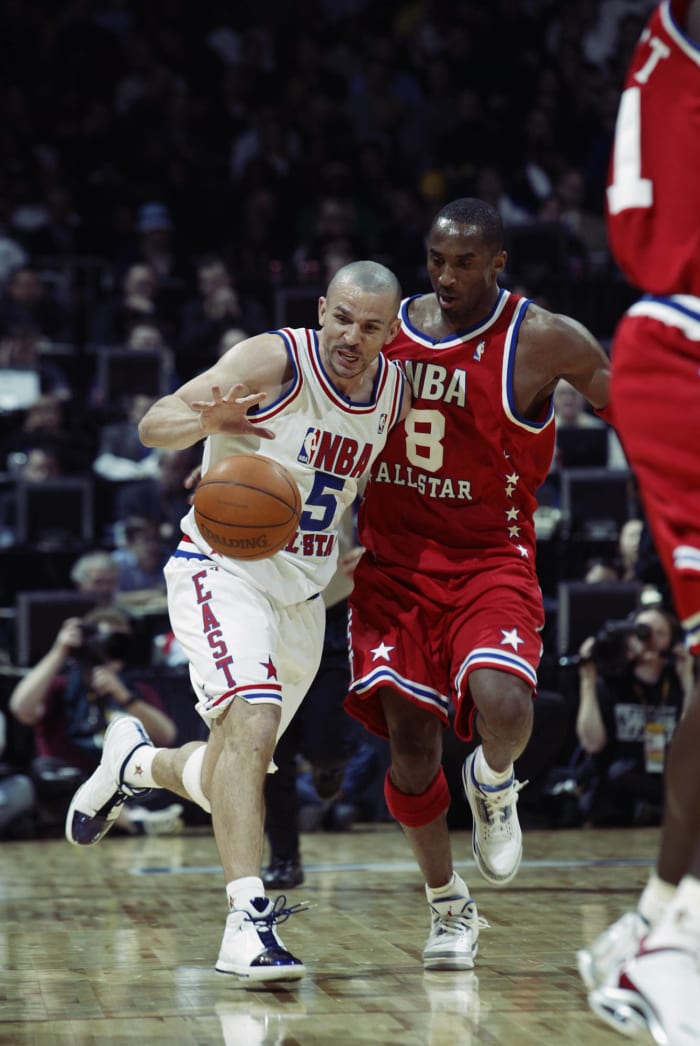
It took five appearances, but Kobe Bryant finally became the most popular man in the NBA. He topped the voting with 1,474,386 votes, and he put on a show. The Atlanta crowd got a 22-point, seven-rebound, six-assist performance out of Bryant. It was also his last chance to go head-to-head with Michael Jordan at the All-Star Game. MJ obliged him with a couple of post-ups and gave fans a memorable interaction.
2004 – LA duo dominance
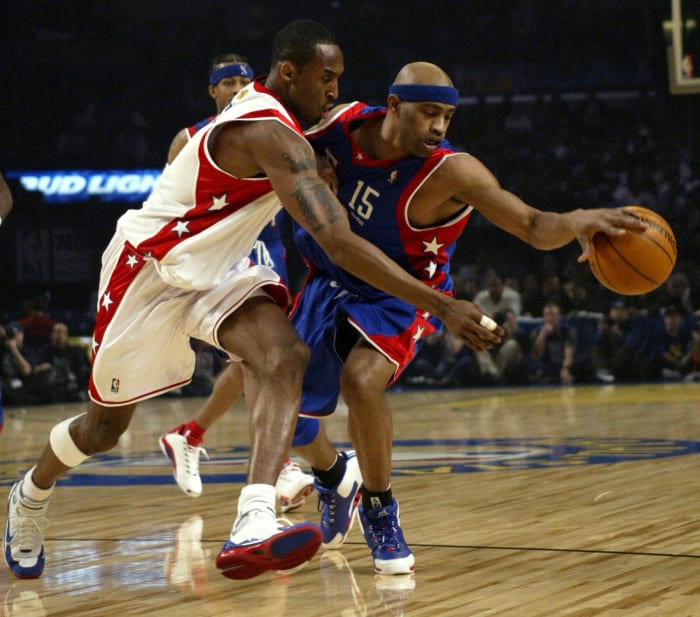
Kobe Bryant and Shaquille O’Neal’s relationship was strained to say the least in 2004, but they kept it cordial for the home crowd in Los Angeles at the All-Star Game where they were teammates — much to the Eastern Conference’s chagrin. The two combined for 44 points and helped the West edge the East, 146-142. O’Neal would go home with the MVP, and it would be a long time before fans saw the two team up at the All-Star Game again.
2005 – Still little brother
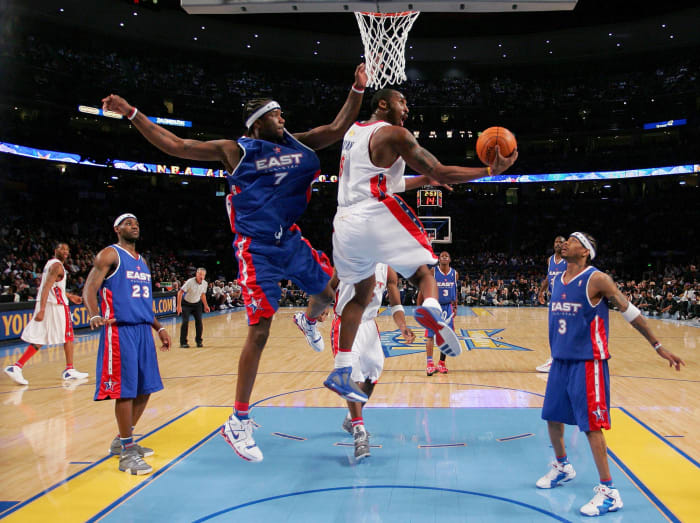
Kobe Bryant spent most of the 2004-2005 season trying to prove he didn’t need Shaquille O’Neal to win. Unfortunately, things didn’t work out for him that season, including at the NBA All-Star Game. Like the highly anticipated game between the two on Christmas Day, Bryant had the superior statistical game with 16 points, seven assists and three steals. But O’Neal got the win for the Eastern Conference.
2006 – Feeding McGrady
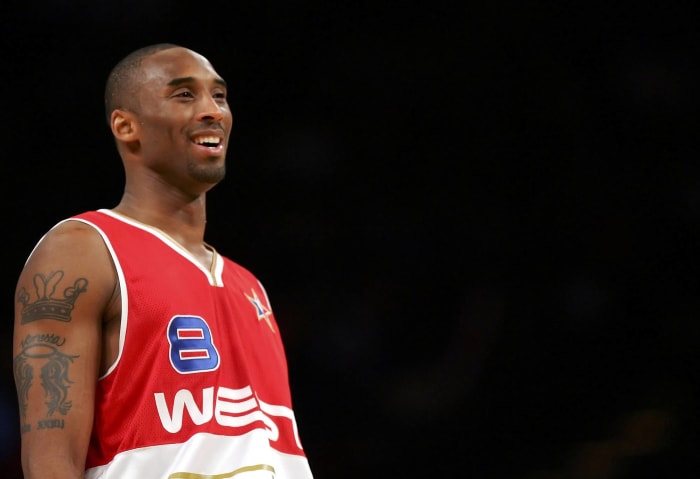
It is a tradition that an All-Star player representing the All-Star Game host city should get most of the offensive looks. If you know anything about Bryant, he was a stickler for the history of the game. So with Houston hosting the exhibition in 2006, Bryant was more than willing to take a backseat to Rockets guard Tracy McGrady — well, for most of the game. McGrady went off for 36 points, but the Lakers star may have had the shot of the night, dribbling between his legs to split two defenders and hitting a fadeaway jumper to tie the game with about 30 seconds left. He scored only eight points, but those two were particularly loud.
2007 – MVP No. 2
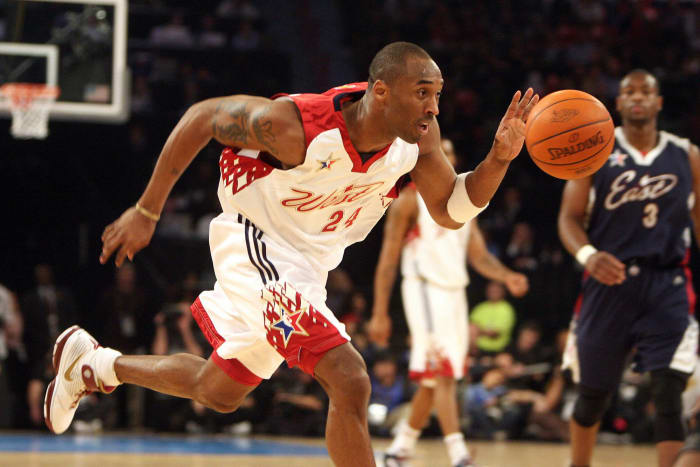
After two close losses to the Eastern Conference, Bryant wasn’t going to let another All-Star Game end in defeat for his side. He left no doubt in 2007. The Black Mamba bore his fangs in Las Vegas, blessing the Thomas & Mack Center with a 31-piece against the LeBron James/Shaquille O’Neal-led Eastern Conference team. He would claim his second All-Star MVP after helping the West to a 21-point win.
2008 – Finger problems
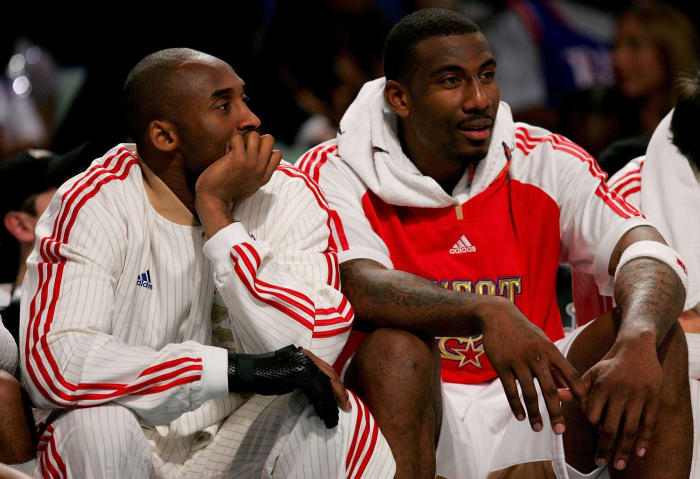
Not even Kobe Bryant was immune to the injury bug, and in 2008, the years of wear-and-tear were starting to catch up to him. He was voted into the All-Star Game with the most votes in the entire league, but Bryant was diagnosed with a torn ligament in his right pinkie heading into the break. He appealed to the NBA to allow him to sit, but he was denied because he played the final game heading into the All-Star weekend. He played just under three minutes and logged one rebound before sitting out the rest of the game.
2009 – (Co-)MVP! (Co-)MVP! (Co-)MVP! 
Ronald Martinez/Getty Images
One of the most unstoppable trios reunited after a five-year cooling period at the 2009 All-Star Game. Kobe Bryant was voted into the game as a starter, Lakers head coach Phil Jackson was coaching the West and Shaquille O’Neal, who was resurrecting his career in Phoenix, was brought on as a West reserve. Bryant led all scorers with 27 points, and O’Neal threw in 17 points in just under 11 minutes to help the West dominate the game. The two shared MVP honors, both looking happy to playing with each other again.
2010 – Too hurt to play

After a year of pushing himself through injuries, Bryant’s body appeared to be falling apart again heading into the All-Star break in 2010. His fractured index finger from the previous season was still ailing him, and he missed his first games since the 2006-2007 season due to a bum ankle. He still was able to get the most All-Star votes, but unlike in 2008, the All-Star Game wouldn’t be graced with his presence.
2011 – King of Los Angeles
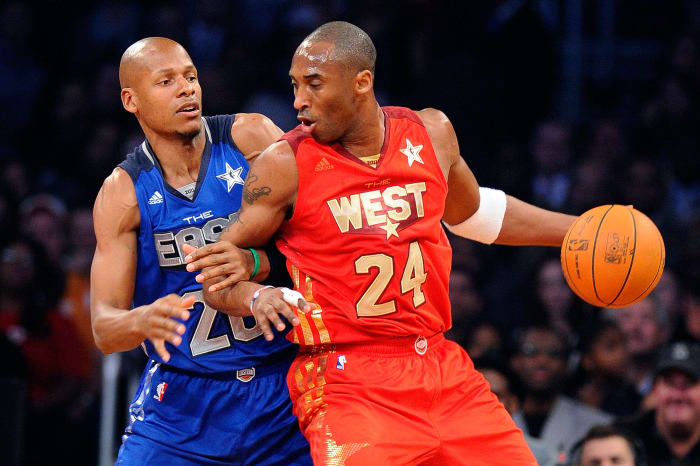
Kobe Bryant may have sat out the 2010 All-Star Game, but the year following his absence may have been one of the best of his career. He beat the Boston Celtics in the NBA Finals, he was named Finals MVP, he led the voting for the NBA All-Star Game again and he had an unforgettable performance in front of the friendly Los Angeles crowd. The younger All-Stars kept feeding him, and he kept knocking down shots. He would finish with a game-high 37 points, grabbed an astounding 10 offensive rebounds and earned his fourth and final All-Star Game MVP.
2012 – The Masked Mamba origin story
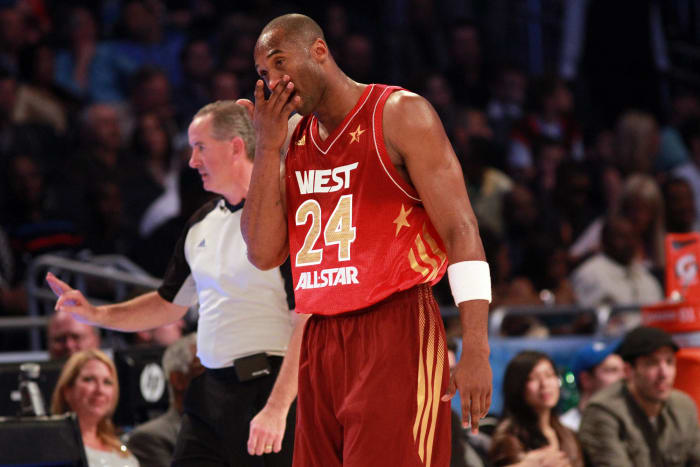
Who says people don’t try in the All-Star Game? Dwyane Wade and Kobe Bryant brought a little bit of the old school mentality back into the midseason exhibition, and the Mamba got the short end of the exchange. Bryant drove past Wade, but the Heat guard didn’t let him get an easy basket, fouling him so hard that the Lakers guard broke his nose. Despite the injury, he continued playing and finished with 27 points. Bryant would get his revenge a couple of weeks later, donning a protective mask and dropping 33 on Wade en route to a 10-point win. He was never one to pass up a chance at revenge.
2013 – Most popular man in the NBA 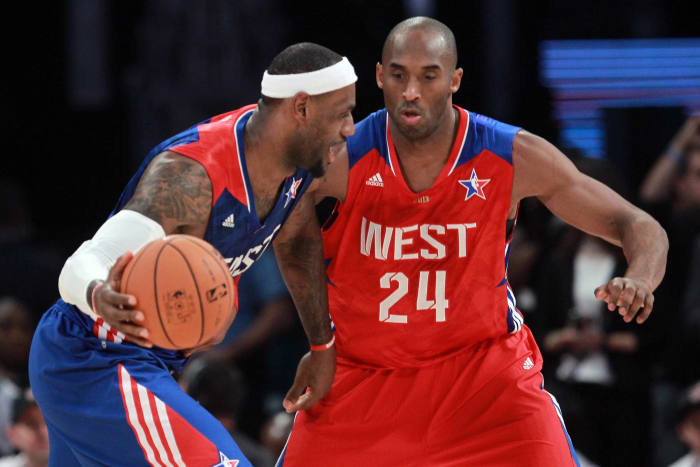
There must be something in the Houston water because Bryant’s performances when the city hosts the All-Star Game have been less than stellar. Still, as an elder statesman, he once again got the most votes but was held to nine points. He made it up with eight assists and helped Kevin Durant thrive to win an All-Star MVP.
2014 – Six-game All-Star

When Kobe Bryant tore his Achilles tendon, everyone questioned whether he could return to the same level of production he had before. When he came back in early December, he had a few 20-point performances but ultimately was shut down because of his bulky knee. He practically begged fans not to vote for him when the All-Star Game rolled around, but he still ended up being voted in. He was replaced by Anthony Davis and missed the rest of the season.
2015 – Record-breaking selection 
After undergoing surgery to repair his knee, Bryant came back and put up some impressive numbers at 36 years old. Still, after a tremendous dunk in New Orleans, a torn rotator cuff ended any sort of hope for a complete season. At the time of his injury, Bryant was averaging 22.3 points, 5.7 rebounds and 5.6 assists per game, earning him a record 17th consecutive All-Star selection thanks to the fan vote. He would be replaced by DeMarcus Cousins on the West roster.
2016 – A legendary send-off

When Kobe Bryant came back in 2014 after his knee surgery, he begged fans not to shower him with adulation. So when Bryant announced his retirement in early November, he surely didn’t expect a farewell tour of endless tributes and “MVP” chants in opposing arenas, yet that’s what he got. The fans also showed their appreciation by voting him into the NBA All-Star Game for the 18th and final time. He contributed 10 points and seven assists to the West’s 196-173 win before getting a standing ovation from the Toronto crowd.
2020 – Gone, but never forgotten
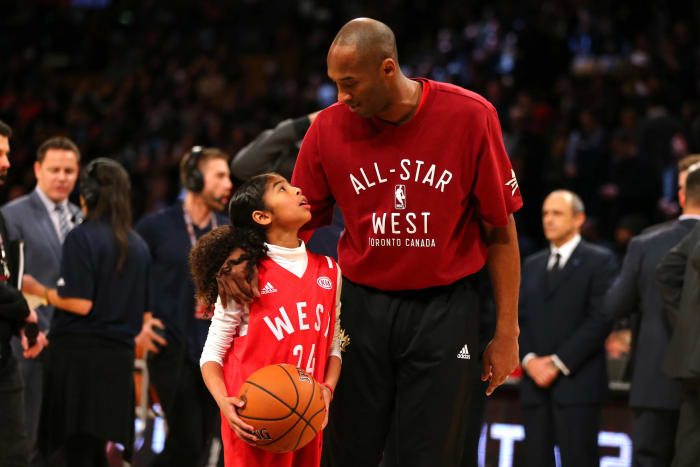
Bryant’s death shook the basketball world, but the NBA gave him a proper tribute at the exhibition he once dominated. The 2020 All-Star Game included a couple of twists fit for the Black Mamba. Team Giannis wore Bryant’s signature No. 24, while Team LeBron rocked the No. 2 of Gianna Bryant, Kobe’s daughter who also lost her life in the helicopter crash.